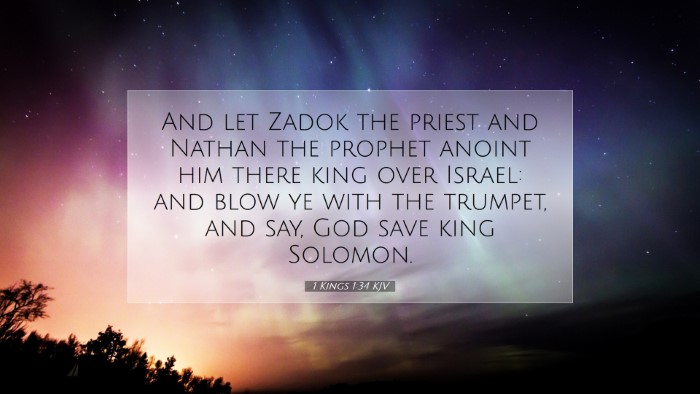Commentary on 1 Kings 1:34
Bible Verse: "And let Zadok the priest and Nathan the prophet anoint him there king over Israel: and blow ye the trumpet, and say, God save king Solomon."
Introduction
The anointing of Solomon as king over Israel marks a pivotal moment in biblical history. This event is not merely a political transition but a fulfillment of divine promise and prophetic intervention. As we explore 1 Kings 1:34, we look at the significance of anointing, the roles of key figures involved, and the implications for Israel’s future.
Contextual Background
In the preceding chapters, we find King David, advanced in years, facing the impending transition of power. Adonijah, one of his sons, attempts to seize the throne, leading to a division among the people of Israel. However, God’s chosen successor is Solomon, and thus, this verse is critical in establishing the rightful heir and uniting the kingdom under divine authority.
Insights from Public Domain Commentaries
Matthew Henry's Commentary
Matthew Henry highlights the divine orchestration behind Solomon's anointing. He notes that the involvement of both Zadok the priest and Nathan the prophet emphasizes the religious legitimacy of Solomon’s kingship. Henry writes:
"By this anointing, Solomon was justified as the divinely appointed ruler, which would garner loyalty from the people and signify God’s favor."
Henry also points out the significance of proclaiming "God save king Solomon," which serves not only as a request for divine favor upon Solomon but also as a rallying cry for the people. The trumpet signifies a call to acknowledge Solomon’s reign both politically and spiritually.
Albert Barnes' Notes
Albert Barnes elucidates further on the roles of Zadok and Nathan, stressing their importance in Jewish religious life. He observes:
"Zadok was a priest with a lineage tracing back to Aaron, thus providing a sacred endorsement for Solomon’s kingship. Nathan’s role as a prophet solidifies the royal authority by ensuring divine endorsement to the leadership."
Barnes notes the historical context wherein anointings were typically performed in significant locales, such as Gihon, a well-known site in Jerusalem. This choice of location underscores Solomon's immediate association with God’s promise and David’s legacy.
Adam Clarke's Commentary
Adam Clarke presents a detailed exploration of the actions taken before and during the anointing. He emphasizes the urgency of this event, stating:
"The kingdom was in turmoil with Adonijah proclaiming himself king; thus, swift action was necessary to secure Solomon’s position."
Clarke also reflects upon the importance of the public proclamation at the anointing event. The act of blowing the trumpet serves multifaceted purposes:
- Declaring Sovereignty: It announces Solomon's kingship to the people.
- Conveying Divine Blessing: It signifies God's blessing and favor.
- Creating Unity: It aims to unify the supporters of Solomon against Adonijah's claims.
Theological Implications
The anointing of Solomon brings several theological implications:
- Divine Sovereignty: This verse exemplifies God’s sovereignty in choosing leaders and establishing authority.
- Typology of Christ: Solomon's anointing foreshadows the anointing of Christ as King, revealing God’s plan for ultimate redemption.
- The Role of Community: The public nature of the anointing signifies the involvement of the community in God's plan, highlighting the collective identity of the people of Israel.
Practical Applications
For pastors, students, theologians, and Bible scholars, there are several practical applications derived from 1 Kings 1:34:
- Understanding Leadership: Reflect on the attributes of godly leadership as exemplified in Solomon’s anointing, emphasizing the need for divine endorsement in leadership.
- Community Involvement: Encourage communal recognition of God’s chosen leadership in the church and society, fostering unity and collective purpose.
- Examine Faithfulness: Consider the faithfulness of God’s promises throughout history, encouraging trust in His sovereign plans for their lives and communities.
Conclusion
The anointing of Solomon as king over Israel in 1 Kings 1:34 is a significant event emphasizing God's sovereignty, the legitimacy of leadership established through divine calling, and the role of prophetic and priestly endorsement. By integrating the insights from Matthew Henry, Albert Barnes, and Adam Clarke, we gain a multidimensional understanding of this passage, inspiring both scholarly inquiry and practical application in our lives today.


